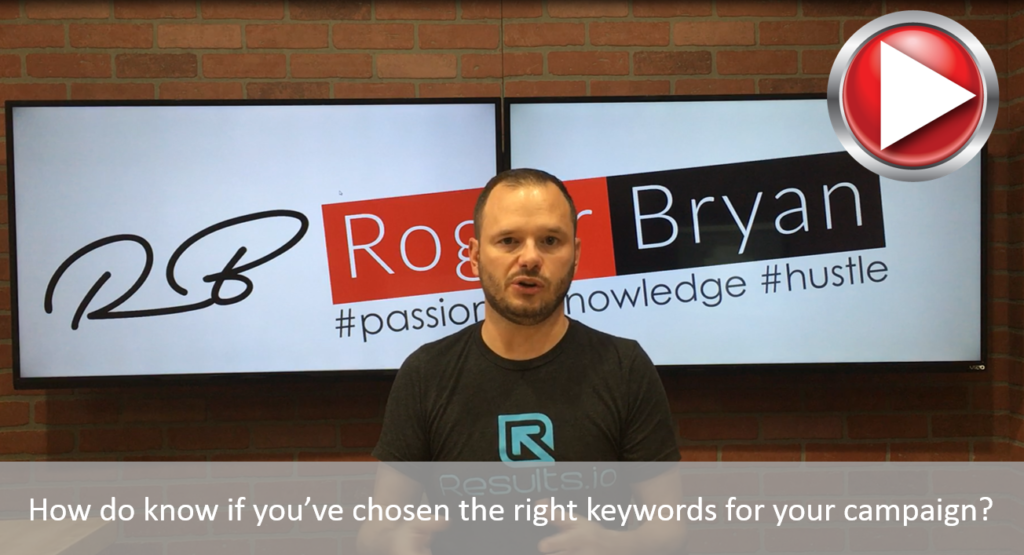
Looking to better optimize your campaigns? In this video Roger Bryan covers the different dynamics for choosing keywords.
Let me paint a picture for you. It’s lunch, you grab your cellphone, decide to go over to Google. You type in a couple keywords, and what you’re doing is you’re actually looking for yourself. Now I’m not talking about googling your name, but maybe you’re trying to google your service, or the product that you offer. And you don’t find it on the first page, so let’s talk about what went wrong here. Choosing the right keywords is absolutely critical. Now, I’m not talking about very generic, singular keywords. I’m talking more about the overall strategy of how human beings communicate with their technology. It’s important to understand that it’s not just about typing in what you’re looking for anymore. You’ve also got to be cognizant of the way that people use voice search, especially in the services side of the world for local-based businesses.
So when we think about how people search today they’re going to do it in three sections. Let’s talk about the first two. Typically when they search they’re going to search for specifically what they’re looking for, and then they’re going to search for it in a specific geographical area. So that geographical area may be the city, the state, the region, the nickname of where they are from. Or it could be from things like near me, close by. So think about it from the healthcare perspective. So I’m sitting there. I just came off the field. I know that I’ve sprained my ankle really bad. I’m worried that it might be broken. I’m going to think about it from two different perspectives. I’m going to either think about it from a hospital or urgent care perspective, and then the location, or I might think of it from an ankle sprain perspective. Both of those have a little bit of different context to them.
If I’m looking specifically for an urgent care I know exactly what I want, where I’m going. I just need to find the closest one, and/or the one that relates to maybe the insurance that I have. On the other side if I’m searching for ankle sprain I might be looking for how can I tell whether or not I need to go to the doctor’s, or to the urgent care. So we have to understand that there’s two different context in which those searches can be made. When you create the content on your website you’re not necessarily going to create different content for both. You’re going to have macro content that’s going to cover you as an institution. Hospital, urgent care, specialty center, whatever that may be. Then on the other side is when you get into the treatments, conditions, doctors, specialists, surgeons that relate to that specific issue. You’re going to need content that covers that.
By creating that content, being cognizant of the different ways that people search, you could put forth the best opportunity to convert people from the search for a solution to their problem, to we are the provider of that problem, interact with us. This goes through from the keyword, to the title, to the meta description, and all the way down through the content, and how Google indexes that content based on the the intent of what you write. Intent is an important word here too. We talked a little bit about these semi-macro search procedures where people might be looking for a certain type of institution, problem, or solutions to a specific problem.
Now we’re going to talk a little bit about commercial intent. Does the searcher intend to buy based on their search? A good example again is ankle sprain. That might be more of a Wikipedia-style research query. They might be looking to decide whether or not their ankle sprain is a problem. Whether or not they have an ankle sprain. That doesn’t necessarily mean that they need treatment for it. So when you create your content, and you think about those macro perspectives, we’re probably not going to focus in on ankle sprain because it’s got a low probability of converting into a paying customer. So we take that a step further, and we do start to look for ankle sprain doctor, ankle sprain specialist, ankle pain treatments. Things like that.
Now, we’re going a layer deeper into what’s called commercial intent. That person is intending to buy. Now, commercial intent is magnified when they add in a geographical location to what they’re searching for, or a brand for what they’re searching for. So if you think about it like this if you’re based in Cleveland, Ohio. You’ve got a couple different healthcare organizations that you can be working with. So you’ve got the Cleveland Clinic. You have MetroHealth. If you’re down near Canton you might have Altman’s or Mercy. An individual that will put the brand in with the query is looking for a specific person to offer them that solution. In the healthcare space this can happen quite often because brands can be so big.
They can dominate a geographical area. They can be the primary leader of services in that market. So if someone was to look for Cleveland Clinic, ankle sprain, treatment, or doctors, or specialists their focusing indirectly on who they want to provide the service. What service they need, and the type of solution that they’re looking for. When you get that that’s a long-tail commercial-intent keyword. That’s going to be a buyer nearly every time.
So when you, as an individual, are searching, and you’re doing it from the perspective of where do I place think about that. Think about the query that you put in, and think about the person that might be entering that. Think about it from the perspective of your brand, your service, and then the intent of the searcher, either from a geographical perspective or from a buying perspective. Doctor, Baltimore, Cleveland, whatever you want it to be, so that you can get the whole context of the search query. If you just go in and type in ankle sprain you’re not going to really find commercial-intern oriented keywords i.e. local providers of a service relating to that problem that individual has.
Now if you’re watching this video you can be a couple different people. You could be an agency that serves the healthcare space. You could be a content writer that serves the healthcare space. You could be in the healthcare space looking for agencies that specializing in working with you, or you could actually be a doctor at a healthcare organization that’s trying to get a better understanding of how you can search for terms and better communicate to your marketing leads what needs to be done in order to drive your business.
So I wanted to end with a little bit of a proper communication strategy. So if you are the individual that’s searching, and you don’t find what you’re looking for, and you want to communicate that back to a lead the things that you can do to help them understand the context of the problem that you see is take a screenshot. You’re probably going to be doing this from your cellphone or from a computer. Take a screenshot that shows in the exact search term and the results. That’s really going to help them to understand what they need to focus in on and give them a little bit of information. I’m on my cellphone. I’m in Baltimore, but I’m searching for something that I want to find in Washington DC, or I’m in Cleveland looking in Akron or Columbus looking in Cincinnati. The context in which you’re searching is going to be really important based on your geographical location.
Google’s very smart when it comes to this. They’re going to understand based on where you’re located, based on your IP address, and based on wherever your cellphone’s pinging. They’re going to try and give you the most relevant results to where you are, and if you’re not in the location at which you served you’re probably not going to get the results that you want to see. Now if you are in the location, and you search for a generic term, and you don’t find yourself. But the results that you see are not commercial results anyways i.e. you see Wikipedia, or a healthcare website that’s not related to a hospital treatment condition or service provider then it might be the search term that’s wrong. Think about it a little bit more in depth. Think about it from a branded perspective. Think about it from an intent perspective, geographical locations, or actual providers, doctors, surgeons, treatments, conditions, things like that. That’s really going to help you to get a good feel for how your marketing team is trying to support you, and how you can relay information back to them that will help them to support you better.
Feel free to check out some of the other posts on this blog. We have a lot of great stuff when it comes to healthcare marketing, and if you need anything you can always hop over to the contact page, shoot us a message, and we’ll be happy to help you. Thank you.

